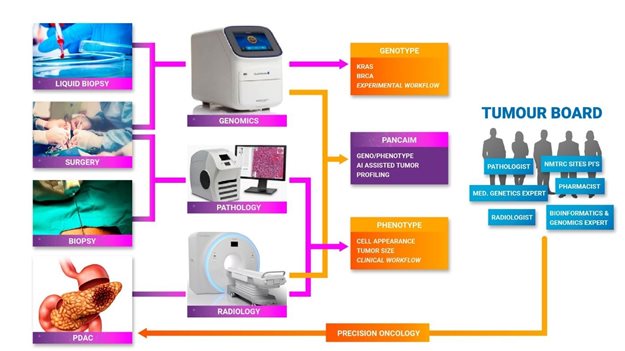
Pancreatic cancer is often quickly fatal, and the incidence is rising. These cancer patients face the lowest survival of all cancers in Europe (median survival time 4.6 months). Europe has the highest incidence of pancreatic cancer, with 150 000 new cases in 2018 and 95 000 deaths/year. On a global scale, the death toll is about half a million every year.
The trend is that it will soon become the second leading cause of cancer-related death in Western societies. Potential new treatments are emerging, but the main challenge is to select the right drug for an individual patient. Novel immunotherapeutic drugs specifically target tumors with a particular genomic profile. However, pancreas patients with tumors with a similar genotype still show a wide range of disease patterns, i.e., differ in phenotype. Pathology and radiology are already in use to assess phenotype but lack genotyping. Research in genomics, pathomics, and radiomics is scattered and limited and does not yet impact pancreas cancer healthcare. Novel genomics technologies such as next-generation whole-genome sequencing (WGS) and liquid biopsy (ctDNA) are emerging but not yet routinely used in Pancreatic Ductal AdenoCarcinoma (PDAC) diagnosis. Pancreas cancer treatment can be improved by an integrated, evidence-based approach.
PANCAIM will optimize and integrate genomics and imaging phenomics using artificial intelligence (AI). Firstly, to help generate breakthrough knowledge to increase understanding of pancreas cancer biology. Secondly, to develop trusted, impactful AI applications for regular clinical use. The aim is to help clinical decision-makers to give the right treatment to the right patients at the right time. The aimed effect is to improve treatment outcomes of pancreas cancer patients avoiding the current costly trial-and-error use of expensive drugs with strong side-effects. AI is currently transforming the field of healthcare. Worldwide interest in AI is high and snowballing, fuelled by the availability of large digital datasets (“big data”). AI is the current most promising technology to integrate and optimize evidence-based decision tools.
PANCAIM enabled PDAC precision oncology
PANCAIM builds on four key concepts of AI in Healthcare: clinical expertise and high amounts of carefully documented data, AI experts, and MedTech companies to collect the data and bring AI to healthcare. Six top-expert clinical partners provide eleven Pan European repositories of almost 6000 patients open to ongoing accrual. These clinical centers treat more than 2,000 PDAC cases each year. SME Collective Minds builds a trusted, GDPR-compliant platform connecting to clinical centers and hosting the research AI. SME TheHyve builds tooling to connect to worldwide genomic repositories (EOSC Health) and help scientifically explore the data. Three partners provide expertise in AI healthcare across all the clinical modalities involved. Finally, Siemens Healthineers provides their AI expertise and clinical tooling to bring PANCAIM solutions into healthcare. These tools will be clinical validation and ready for swift clinical integration in 3000 health care institutes.
PANCAIM - PANcreatic Cancer AI for genomics and personalized Medicine
More info on: www.pancaim.eu

PANCAIM has received funding from the European Union’s Horizon 2020 research and innovation programme under Grant Agreement No. 101016851.
Related news items

Mathias Prokop appointed department head of Radiology UMCG He also remains department head of Imaging Radboudumc
11 April 2022 As of May 1, Mathias Prokop will become Department Head of Radiology at UMCG. He will fulfill this role in addition to his current position as Professor and Department Head of Imaging at the Radboudumc. Jurgen Fütterer will assume the daily management of the Radboudumc clinic. go to page.aspx?width=800&height=534&ext=.jpg&type=BlockColumn1Zoom1)
Aiosyn and Radboudumc are the first in the Netherlands to implement AI in the clinical pathology workflow Digital pathology slides will be screened with a quality control algorithm
4 April 2022 Aiosyn, a company that develops AI-powered computational pathology analysis for clinical diagnostics, and the department of pathology of Radboudumc, will collaborate to implement an algorithm for quality control of digitized histopathology tissue slides. go to page
Thomas van den Heuvel wins Stairway to Impact Award for safer pregnancies using AI Award for safer pregnancies using AI
1 December 2021Radboudumc researcher Thomas van den Heuvel receives the Stairway to Impact Award from Dutch Research Council NWO. He receives this prize for the development of the BabyChecker, a smartphone application that allows midwives to make ultrasounds during pregnancies.
go to page
KWF grant for better selection of individuals and lung nodules in lung cancer screening
1 November 2021 The Dutch Cancer Society has awarded the consortium project ‘Multi-source data approach for Personalized Outcome Prediction in lung cancer screening’ with a grant of 1,425,000 Euro. Colin Jacobs will lead the work package on using artificial intelligence for accurate risk estimation of lung nodules. go to page
Awarded KWF grants for Radboudumc researchers
18 December 2019 KWF is investing 2.7 million euros in five different studies at Radboudumc. The awards are part of the new round of funding by DCS, in which over 34 million euros will be granted to Dutch cancer research. We congratulate our researchers with this funding and wish them success with their great work. go to page
